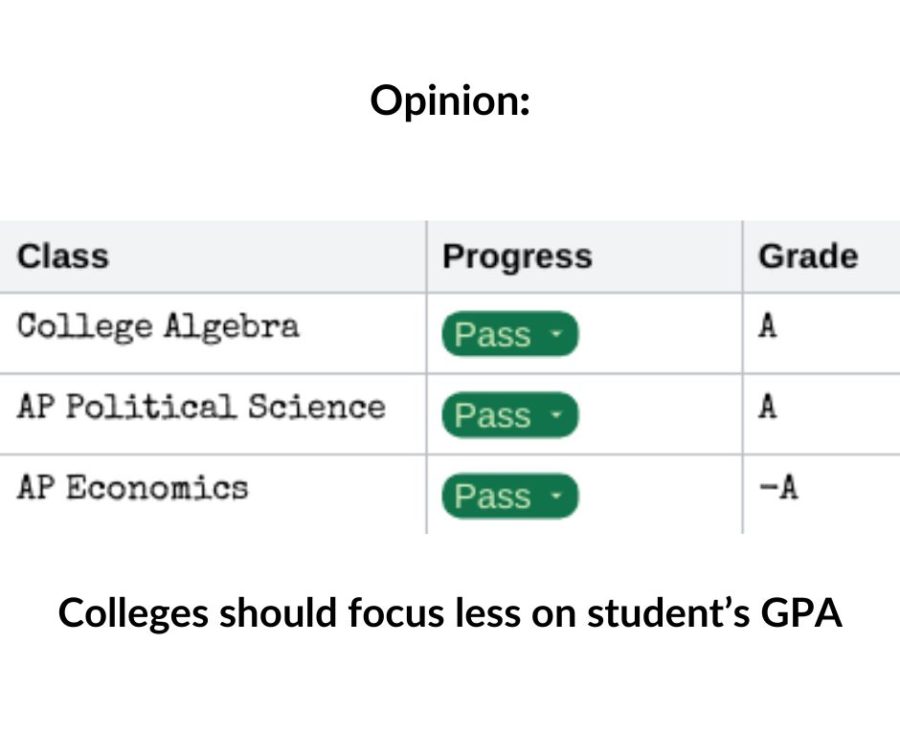Opinion: Colleges should focus less on student’s GPA
March 10, 2023
Grade point average, also known as GPA, is ingrained in the experience of high school and post-secondary students across the United States. From the perspective of high school students, the preservation of a student’s GPA in high school is correlated to the acceptability of students character and application throughout the process of college admissions. However, the recentered focus on a student’s GPA as a distinction of the students acceptability throughout the process of college admissions generates a social framework that constrains the students education.
The academic standard of the GPA system that is concentrated in students education throughout the United States preceded from the realm of higher education. According to Lester Hunt’s “Grade Inflation: Academic Standards in Higher Education”, in 1786, Yale developed the foundational framework for the GPA system after observing the meritoric nature of factories.
The academic standard of the GPA system developed to the point that students’ GPA became the only verified measure to reassure that the students could be admitted into a college. According to Andrew Beale’s “The Evolution of Colleges Admission Requirements”, in the 1950’s, colleges restructured the college admissions process to emphasize the students GPA over other categories weighted throughout the process such as academic scholarships and general activities. The exclusive focus on a student’s GPA is a practice throughout the college admissions process that has been continued and preserved since the 1950’s.
The recentered focus on the students GPA regardless of other weighted categories such as academic scholarships and general activities that has been preserved since the 1950’s has consecrated the modern focus for students education.
The modern focus centered around the concept of student’s education prioritizing the entailed notion of the student’s GPA is an inaccurate representation of the students position. According to the Washington Post, the implementation of GPA is an inaccurate academic standard to measure students’ permissibility or character for a college throughout the college’s admission process.
Therefore, the reliance on GPA as an academic standard to measure students’ permissibility for a college should be deemphasized throughout the college’s admission process due to the general inaccuracies that it proposes. However, college admission can take alternative approaches towards evaluating student performance throughout high school and the promise that students could provide to the college throughout the college admissions process. According to Valen Johnson’s “An Alternative to Traditional GPA for Evaluating Student Performance”, colleges can adopt the process of evaluating students’ merits and involvement in academic environments. The student’s performance and promise for the college should be evaluated on the basis of academic characteristics that are developed through the students’ exposure towards external organizations and academic scholarships.
The notion of alternative approaches towards student evaluation was developed further by Johnson, he said, “The expressed goals of the Academic Affairs Committee in recommending this reform are to eliminate the inequities inherent in unadjusted GPA measures; to reduce the increasingly common practice among students of selecting courses on the basis of expected grade; to combat grade inflation by encouraging faculty to assign grades differentially on the basis of student performance; and to further enhance the intellectual environment.”
In both particular cases, the exposition of the student’s permissibility into a college throughout the college admission process should be reflected on the basis of the students participation and involvement in external organizations and academic scholarships. However, the alternative to evaluating student’s education is presented against the confronted reality that student’s GPA constrict education throughout the United States. Furthermore, the necessity of deemphasizing students’ GPA is also communicated through the psychological impacts of reflecting student’s GPA throughout the college admissions process.
The psychological impacts of students’ focus on their GPA for the college’s admission process has led to detrimental effects on student’s education. According to Christine Carter’s “High GPAs, Low Happiness?”, the focus on students’ GPA has led to 57% of students reporting that the structure of the college’s admission process in relation to their GPA has led to them having emotions of stress and anxiety. Furthermore, over 90% students have expressed that they have cheated on substantial standardized tests to preserve a particularized GPA in relation to the prospect of being permissible for college acceptance. In both particular cases, the issue developed is the psychological impacts of students’ focus on the presentation of their GPA in relation to college acceptance is constricting to students’ education. However, the problem is systematic, but college admissions across the United States are transitioning from emphasizing the importance of student’s to alternative methods to student’s evaluation.
The transition towards the deemphasizing of students’ GPA through the presentation of alternative methods to students evaluation during the college admission process is becoming a popular trend throughout the United States. According to NBC, hundreds of colleges throughout the United States have deradicalized the emphasis on students’ GPA. The only college that has disregarded the notion of students’ GPA in Minnesota is the University of Twin Cities Minnesota.
The solution is to transition from the application of students’ GPA towards alternative methods of student evaluation in the college’s admission process. The fundamental issue that is derived with approaches towards the emphasis with the institution of the GPA is that it is an inaccurate academic measure in relation to students evaluation. Furthemore, the restored focus on students’ GPA has significant psychological impacts on students’ education and relationship towards the college process. In both particular cases, the proposition of student education being centered around the GPA of students leads to the constriction of students’ education. However, colleges are adopting alternative approaches in student evaluation throughout the United States.







